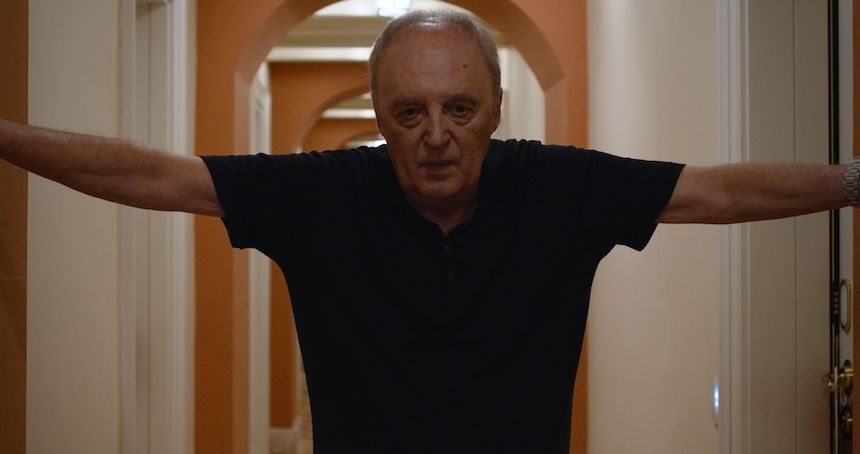DARIO ARGENTO PANICO Review: One for the Fans, And Only the Fans

Biodocs are always in danger of becoming hagiographies, especially when their subjects participate in the film and are offered the opportunity to self-mythologize.
They’re also always in danger of closing themselves off to any viewers not already familiar with their subjects. Dario Argento Panico falls victim to both these pitfalls of the genre, but offers enough to be worthwhile to those already dedicated fans of Dario (I’ll be using his first name as other Argentos are featured in the film) and at least muddies the waters a bit on the man, if not the filmmaker.
The film follows the arc of Dario’s life and career beginning with his time as a child tagging along to his photographer mother’s shoots where she took glamor shots of stars like Sophia Loren, which he says taught him how to shoot and light women. He and his sister Floriana discuss their father’s work as a film distributor that allowed him to finance and distribute Dario’s films.
Dario’s ex-wife Marisa Casale talks about falling in love with him as a teenager because he was so impressive as a writer. All of which sets the stage for a film that rather deftly combines the personal and professional history of its subject.
But as the film goes on, and Argento’s daughters Fiore (with Casale) and Asia (with Daria Nicolodi) are introduced, it seems to forget that even some of the most dedicated fans may not know everything. When Asia first appears and begins to talk about her mother and father, it’s possible for those who do not know her mother is Nicolodi to think she’s speaking about Casale.
Later, when Asia speaks about her sister Anna and how she served as an inspiration for the film Trauma, viewers are likely to be even more bewildered given that the film never specifies, via talking head or onscreen text, that Anna is Asia’s half-sister on Nicolodi’s side.
Panico also assumes viewers are familiar with Dario’s entire body of work, referencing relative deep cuts like The Five Days, The Phantom of the Opera, and The Card Player with little to no introduction, while also seemingly acknowledging their status as less vital by not spending significant time on their creation. Sections on the creation of the better known films, including The Bird with the Crystal Plumage, Suspiria, and Opera, often offer more about the behind the scenes drama than the Dario’s filmmaking choices and process.
The anecdotes are often funny and sometimes insightful about Dario, the imperfect person. We learn that Dario clashed with Tony Musante on the set of The Bird with the Crystal Plumage but that Tony was later effusive in his congratulations when the film was a success. We also learn that Dario became frustrated with and often ignored actor Cristina Marsillach on the set of Opera after she refused to take off her bra for a scene where her white shirt gets soaked through.
Yet when it comes to the innovations in thriller and horror filmmaking Dario made, Panico relies heavily on telling rather than showing. Directors Nicolas Winding Refn, Gaspar Noé, and Guillermo del Toro gush, often poetically, about Dario’s films and how much they inspired them, with both Refn and Noé commenting on the addictive qualities of watching Dario’s films. These moments are lovely, but feel somewhat underserved by the lack of clips showing viewers of this film what made those filmmakers fall in love with Dario.
Alternatively, Panico’s most interesting moments come from the use of archival interview footage. Twice in the film, director Simone Scafidi intercuts interviews from decades ago with interviews done for Panico to fantastic effect.
The first sees Dario speak frankly about his considerations of suicide at the height of his success, relaying the story of how a doctor friend told him to place a wardrobe in front of the window to ensure he wouldn’t jump out of it. Scafidi allows Dario now and then to tell parts of the story, which fits together perfectly, offering viewers a glimpse into how firmly embedded the memory is in his mind.
Later, Scafidi applies this technique to a much lighter subject; cutting between a moment where Dario empties his pockets to discuss their contents in an old interview, and doing so now. These scenes almost make one wish the entire film had been structured this way, but then it would be something very different.
As it is, Dario Argento Panico is a mostly standard talking-heads documentary that offers some insights into the personal life and personality of one of the most celebrated horror filmmakers of all time, but does little to invite any viewers not already familiar with his work and biography into the fandom it caters to.







